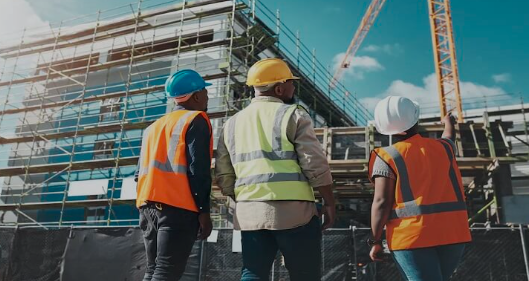
Nigeria, a country with a burgeoning population and diverse infrastructure needs, has witnessed a significant surge in construction activities in recent decades. Construction management, as a discipline, plays a pivotal role in overseeing and coordinating these projects. This comprehensive exploration delves into the intricacies of construction management in Nigeria, encompassing its historical evolution, key components, challenges, and the transformative impact on the nation’s infrastructure development.
Defining Construction Management
Construction management involves the planning, coordination, and supervision of construction projects from inception to completion. In the Nigerian context, where infrastructure development is crucial for economic growth and societal well-being, effective construction management practices are essential to ensure the successful and timely delivery of projects.
Historical Evolution of Construction Management in Nigeria
1 Early Construction Practices
The history of construction management in Nigeria can be traced back to the early days of infrastructure development, where traditional methods and craftsmanship were employed. Community-led initiatives and local expertise played a significant role in the construction of early structures and facilities.
2 Colonial Influence
During the colonial era, the introduction of more formalized construction practices by European powers left a lasting impact on Nigeria’s construction landscape. The construction of roads, bridges, and public buildings followed structured project management approaches influenced by colonial administration.
3 Post-Independence Era
With Nigeria gaining independence in 1960, there was a renewed focus on national development, leading to increased infrastructure projects. The need for efficient construction management became evident, and the government began adopting modern project management principles to enhance project delivery.
4 Contemporary Trends
In recent decades, Nigeria has seen a surge in construction activities driven by population growth, urbanization, and economic expansion. Modern construction management practices have become integral to handling the complexities of large-scale projects, including highways, airports, housing developments, and energy infrastructure.
Key Components of Construction Management
1 Project Planning and Scheduling
Effective construction management begins with meticulous project planning and scheduling. This involves defining project goals, outlining tasks, estimating resources, and creating timelines to ensure that construction activities proceed in a systematic and organized manner.
2 Budgeting and Cost Management
Construction projects in Nigeria, like elsewhere, are subject to budget constraints. Construction managers are tasked with creating realistic budgets, monitoring costs, and implementing cost-saving measures without compromising the quality and safety of the project.
3 Risk Management
Construction projects inherently involve risks, ranging from unforeseen weather conditions to supply chain disruptions. Construction managers in Nigeria employ risk management strategies to identify, assess, and mitigate potential risks, ensuring project resilience in the face of uncertainties.
4 Quality Control and Assurance
Ensuring the quality of construction projects is paramount. Construction managers implement stringent quality control measures, conduct inspections, and adhere to industry standards to deliver infrastructure that meets or exceeds expectations.
5 Stakeholder Communication
Effective communication with stakeholders, including government agencies, local communities, and project investors, is critical. Construction managers in Nigeria navigate the complexities of stakeholder engagement to build consensus, address concerns, and foster positive relationships throughout the project lifecycle.
6 Procurement and Supply Chain Management
Efficient procurement and supply chain management are vital components of construction management. This involves sourcing materials, selecting contractors, and negotiating contracts to optimize project costs and timelines.
7 Health and Safety Compliance
Construction management in Nigeria places a strong emphasis on health and safety compliance. Construction managers implement robust safety protocols to protect workers, adhere to occupational health standards, and minimize the risk of accidents on construction sites.
Challenges in Construction Management in Nigeria
1 Infrastructure Deficit
One of the significant challenges in construction management in Nigeria is the existing infrastructure deficit. The demand for new infrastructure far exceeds the current capacity, leading to a backlog of projects and increased pressure on construction managers to deliver within tight timelines.
2 Funding Constraints
Construction projects often face funding challenges, with budgetary constraints affecting the timely completion of infrastructure projects. Construction managers navigate these constraints by seeking innovative financing models, engaging with public-private partnerships, and optimizing resource allocation.
3 Regulatory and Permitting Processes
Navigating the regulatory landscape and obtaining necessary permits can be a cumbersome process in Nigeria. Construction managers work closely with regulatory authorities to streamline approval processes, ensuring that projects comply with legal requirements.
4 Skilled Labor Shortages
The construction industry in Nigeria grapples with a shortage of skilled labor. Construction managers face the task of not only recruiting and retaining skilled professionals but also investing in training programs to bridge the skills gap and enhance the local workforce.
5 Political and Economic Instability
Political and economic uncertainties can impact the construction industry. Construction managers in Nigeria must adapt to changing economic conditions, policy shifts, and geopolitical factors that may influence project timelines and funding sources.
The Transformative Impact of Construction Management in Nigeria
1 Economic Growth and Development
Construction management plays a pivotal role in driving economic growth and development in Nigeria. The successful completion of infrastructure projects, such as roads, bridges, and energy facilities, contributes to enhanced connectivity, increased economic activity, and improved living standards.
2 Job Creation and Skills Development
The construction industry is a significant source of employment in Nigeria. Construction managers contribute to job creation by overseeing projects that require a diverse workforce, from skilled laborers to project managers. This, in turn, contributes to skills development and capacity building within the local community.
3 Urbanization and Modernization
As Nigeria undergoes rapid urbanization, construction management becomes instrumental in developing modern and sustainable urban infrastructure. Construction managers oversee the construction of residential and commercial buildings, transportation systems, and utilities that cater to the needs of urban populations.
4 Enhanced Public Services
Infrastructure projects managed effectively through construction management contribute to the delivery of improved public services. From the construction of schools and healthcare facilities to the development of water supply and sanitation systems, construction managers play a crucial role in enhancing the overall quality of life for Nigerians.
Future Trends in Construction Management in Nigeria
1 Adoption of Technology
The future of construction management in Nigeria is poised for increased adoption of technology. Building Information Modeling (BIM), drones for surveying, and project management software are expected to become integral tools for construction managers, enhancing efficiency and accuracy.
2 Sustainable Construction Practices
Sustainability is a growing focus in construction management. Future trends involve the incorporation of green building practices, renewable energy solutions, and environmentally conscious construction materials to ensure that projects align with global sustainability goals.
3 Digital Twins and Smart Infrastructure
The concept of digital twins, where a virtual replica of a physical infrastructure is created, is gaining traction. Construction managers may utilize digital twins to monitor and manage the lifecycle of infrastructure, leading to more effective maintenance and asset management.
4 Collaborative Project Delivery Models
Collaborative project delivery models, such as Integrated Project Delivery (IPD) and Design-Build, are likely to become more prevalent. These models promote collaboration among stakeholders, reduce project risks, and enhance overall project outcomes.
Conclusion
In conclusion, construction management in Nigeria stands at the crossroads of challenges and opportunities, navigating a landscape that is both dynamic and crucial for the nation’s development. The discipline has evolved from traditional construction practices to sophisticated project management approaches that prioritize efficiency, quality, and stakeholder engagement.
As Nigeria continues its trajectory of growth and modernization, construction managers will play an increasingly vital role in shaping the nation’s infrastructure. Overcoming challenges such as funding constraints, skilled labor shortages, and regulatory complexities requires innovative solutions and a forward-thinking approach.
The transformative impact of construction management extends beyond the completion of physical structures; it encompasses economic development, job creation, and the enhancement of public services. Looking to the future, the adoption of technology, sustainable practices, and collaborative project delivery models will shape the next phase of construction management in Nigeria, contributing to a resilient and vibrant built environment for generations to come.







